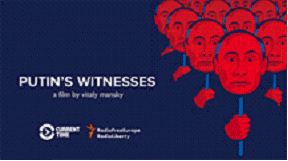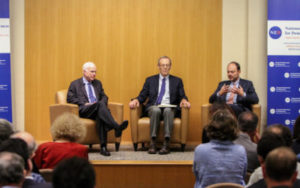Most protests and demonstrations in Russia now appear to be taking place in small and mid-sized cities, sometimes spreading to larger cities and ultimately to Moscow, notes Russia-watcher Paul Goble. That suggests the kind of sea change in Russian attitudes that may be even greater than that shown by polls or by protests in urban areas and that may ultimately contribute to a tsunami of demonstrations that the authorities will have difficulty coping with.
Thousands of people in Moscow, St. Petersburg, and other cities honored the memory of slain Kremlin critic Boris Nemtsov, and in doing so mourned the loss of a Russia that might have been. Meanwhile, in the Russia that is what it is, state TV elaborated on President Vladimir Putin’s saber-rattling warning to the West about missiles, notes RFE/RL’s Steve Gutterman.
 Of all of Nemtsov’s unfinished political crusades, the one that hits squarely at the heart of Putin’s system is the battle against corruption. It now has a new champion in Alexei Navalny, notes Pavel K. Baev. Putin never mentions Navalny by name. And the same wall of silence surrounds Nemtsov’s name, but the memory refuses to dissipate, he writes in the Eurasia Daily Monitor.
Of all of Nemtsov’s unfinished political crusades, the one that hits squarely at the heart of Putin’s system is the battle against corruption. It now has a new champion in Alexei Navalny, notes Pavel K. Baev. Putin never mentions Navalny by name. And the same wall of silence surrounds Nemtsov’s name, but the memory refuses to dissipate, he writes in the Eurasia Daily Monitor.
“People remember him for different reasons, but for Putin’s elites, increasingly uncertain about the near future and squeezed by sanctions, Nemtsov remains a unique case of a top-level politician who walked away from the entanglements and privileges of power—and had no regrets,” he adds.
Some observers describe Nemtsov’s killing as “the crime of the century,” notes analyst Amy Knight. On February 27, 2018, the Washington, D.C., City Council named a block of Wisconsin Avenue in front of the Russian embassy Boris Nemtsov Plaza, she writes in the NY Review of Books:

Vladimir Kara Murza (far right) with NED’s Carl Gershman (center) and Senator John McCain
Along with members of Congress, Vladimir Kara-Murza, Nemtsov’s former close colleague and the director of the film Nemtsov, spoke at the ceremony. An active Russian opposition politician, Kara-Murza has been the victim of two near-fatal poisonings that he attributes to the Kremlin. Yet he remains optimistic: “The best possible tribute to [Nemtsov] and to his legacy will be a free and democratic Russia, and that day will come.”
Russia expert Andrea Kendall-Taylor reflects on the shifting landscape for democratic governance in Europe and assesses the impact of Russia and China’s authoritarian influence as they converge with one another and with other illiberal actors In the latest Power 3.0 podcast. Kendall-Taylor is a senior fellow and director of the Transatlantic Security Program at the Center for a New American Security (CNAS). Christopher Walker, NED vice president for studies and analysis, and Shanthi Kalathil, senior director for NED’s International Forum for Democratic Studies, cohost the conversation.
 Putin’s address listed U.S. facilities it said Moscow would target in retaliation for a nuclear strike, and he asserted – with the help of on-screen visual aids (above) including maps featuring bows of bending light meant to show missile trajectories – that they could reach their targets in five minutes or less. RFE/RL’s Gutterman adds.
Putin’s address listed U.S. facilities it said Moscow would target in retaliation for a nuclear strike, and he asserted – with the help of on-screen visual aids (above) including maps featuring bows of bending light meant to show missile trajectories – that they could reach their targets in five minutes or less. RFE/RL’s Gutterman adds.
“Russia has a very strong incentive to bring up nuclear issues as often as possible, because when you look at Russia as a nuclear power, it is indisputably a superpower,” Justin Bronk, a research fellow at the Royal United Services Institute (RUSI), an independent defense and security think tank in Britain, told RFE/RL.
“When you look at Russia on almost any other metric, it is, at best, a regional power with declining demographics, budgets, and huge numbers of problems,” he said.







